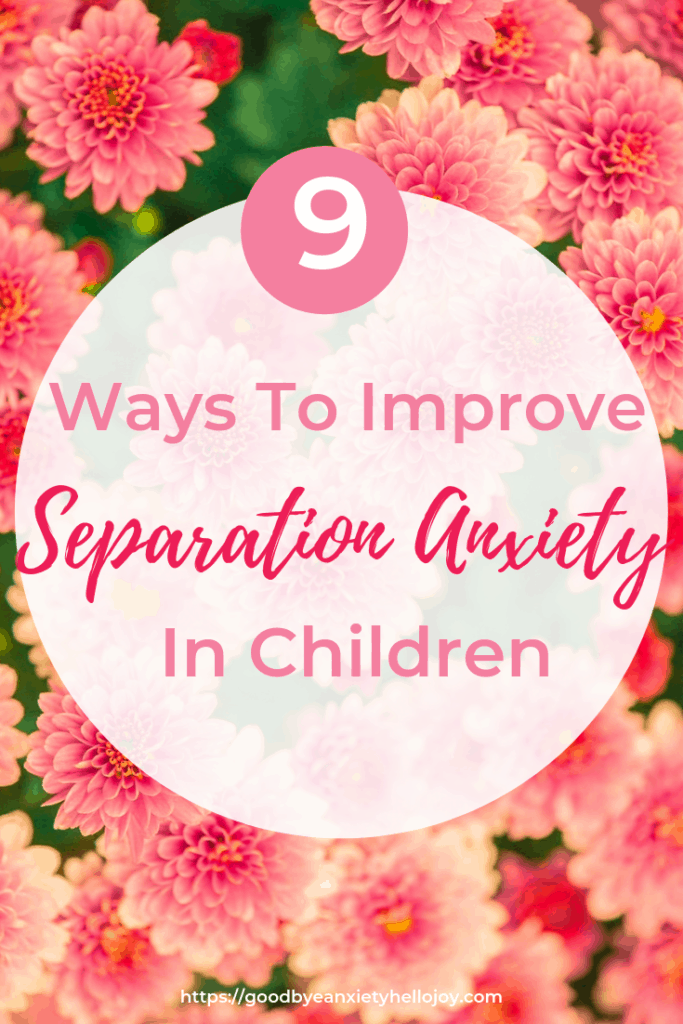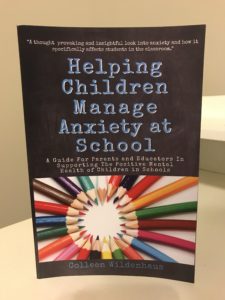
9 Ways to Improve Separation Anxiety in Children
Separation anxiety in children is often a normal stage of development in early childhood. The frequency and intensity of separation anxiety will vary greatly for each child, ranging from quiet whimpers that fade as soon as the parent is out of sight to excessive clinginess that disrupts daily life. Separation anxiety in children becomes a problem when it interferes with normal activities like school, extracurriculars, independence in the home, and friendships. Having to leave your child while he or she is pulled off of you, crying hysterically is one of the most difficult moments parents face.
Fortunately, separation anxiety in children can be treated effectively with a solid plan and patience. I highly encourage you to seek an experienced therapist to help your family navigate these challenges. If you are unable to see a therapist, be sure to explain anxiety to your child, helping him or her understand what is happening in their mind. Here are 9 ways to help with separation anxiety in children.
Listen to Your Child and Address the Worries
Many children will be able to express their worries about being apart. They may fear that something awful will happen to you will you are away. Other times, children anticipate something happening to them and you will not be there to offer comfort. Whatever, the worry, address it. Never blow it off and tell them to stop worrying. Offer reasons to support your belief that they are safe while providing them with resources to use until you are back together again. There are many children’s books that address this topic. You can read these together as a way to start a conversation.
Practice in Small Steps
The best way to overcome separation anxiety is to practice in small steps. Each day, choose something challenging, but simple to work through with your child. If she or he is afraid to be alone on a different floor of the house, practice for 3 minutes while you offer reassurance from downstairs. Once that is mastered, move onto another challenge. For children who are worried about being with another adult, ask a friend or relative to come to your house and stay with your child while you run to the grocery store. Call your child while gone to offer reassurance. If bedtime is an issue, practice the same way. Start with staying with your child until he or she is asleep, then begin staying for 10 minutes and checking on them off and on. Over time, spend less time in bed with them until they are falling asleep independently. This method takes time and patience but it is successful.
Attend Extracurricular Activities with your Child
Many children with separation anxiety do not attend extracurricular activities like dances, sports, or classes because they would ideally need to separate from you in order to participate. In these instances, attend with your child in the beginning. I have sat through dance classes, play practices, choir practices, birthday parties…you name it. Yes, I admit, there are times I am embarrassed, but I do it for my kid. I am upfront with whoever is in charge of the class or event and explain my plan. At first, stand in the classroom or on the field where your child can see you. Over time, work out a plan where you will stay within sight for 10 minutes, then you will stand further away. These transitions must be done slowly and with patience, and you must tell your child the plan.
Stay Consistent and Stick to Your Plan
Children with separation anxiety need to know what the plan is when a separation will occur. Many children will be anxious long before the separation occurs, but over time, a consistent plan will help alleviate the anxiety because they know what to expect. Create little rituals before saying goodbye…hugs, kisses, and loving, supportive words. This consistent plan will help create security and confidence over time.
Separate Quickly
It is incredibly important that once the plan for separation is in place, you leave quickly. Dragging the goodbye out and adding more reassurances, hugs, or incentives to the plan only makes the anxiety increase. Trust me, as a teacher and a mother, it does not get better the longer it takes to separate. Think of it as a band-aid. Pull it off quick. This being said, it is important that there be a plan in place for someone to support your child as you are leaving and once the separation has occurred. Separation anxiety in children is just as hard on the parent as it is on the child. It eases your mind to know that your child’s needs are being cared for once you are gone.
Role Play
Once a plan for separating is created, role play at home in a safe, calm environment. Have your child pretend to leave you and go with the designated adult at school while you pretend to walk away. You could have your child pretend he is at soccer practice and you are going to stand by the designated spot while he practices. While role-playing, have the child use slow breathing and positive talk as he or she would in the real event. You could switch roles, where you are the child, and the child is the adult, allowing them to offer you, as the child, support.
Do Not Show your Anxiety
Wow…this is a hard one. For me, my child’s anxiety always causes me tremendous anxiety. It has taken a lot of practice to pretend I am confident and in control of situations. I have seen the importance of not showing my anxiety to my daughter. Just like anxiety feeds anxiety, my calm voice and actions, help her see and hear that she is safe. Hearing your child beg for you to stay and reaching for you as you walk away is an awful way to leave. The heartache and frustration stay with you. As soon as you walk away, feel free to let the tears flow. Call a friend and cry! It needs to come out, just not in front of your child. As a side note, having spent many mornings crying as I walked away from my child…NEVER apply mascara until after you leave your child!
Separation Anxiety in Children at School
Meet with the school, requesting an adult meet you and your child outside of school for help easing the transition. (Anxiety is a reason to request a 504.) It is important that the school staff member be the same each day in order to build a relationship. Equally important, the drop off needs to occur in a quiet, calm location away from other students. Adding embarrassment to the situation will only make it worse. Depending on the child, he or she may be able to go right to class after the drop-off, while others will need time to calm down in a quiet space before going to class. If a child still struggles while at school, you can plan to send a few emails to your child throughout the day or have the teacher give him or her a note from you at some point during the day. I have found that phone calls are not helpful, as children often start crying when they hear their parent’s voice and then have a hard time ending the call. Other children may benefit from carrying a small reminder of home such as a picture, toy, or note with them all day.
Plan for Leaving and Anticipate Problems
Finally, no matter how much practice and planning has gone into preparing for the separation, give yourself extra time. Feeling the pressure to be somewhere on time while dealing with an anxious child is difficult. For children attending events or classes, know that they may not fully participate. Try to celebrate the fact that they are even attending. When planning your schedule always allow more time than you expect, and if you are lucky and everything goes well, you will have a few quiet minutes to spare for yourself.
Above all, hang in there. You are not alone. Separation anxiety in children is the most common childhood anxiety, and the easiest to treat. People will offer unsolicited advice and judge based on their opinions rather than the facts. Believe in yourself and your child. They want to move past this worse than you! If your child is struggling with anxiety that impacts his or her experience at school, be sure to check out the book Helping Children Manage Anxiety at School.
People will offer unsolicited advice and judge based on their opinions rather than the facts. Believe in yourself and your child. They want to move past this worse than you! If your child is struggling with anxiety that impacts his or her experience at school, be sure to check out the book Helping Children Manage Anxiety at School.
First time seperating is super hard. I remember the first week of school I cried practically every day. It does get easier especially when you see they are learning so much and making friends. But jeez, I have 7 kiddos and it was the same for each one. I should have gotten accustomed to it by number 7. He may have been one of the toughest.
It never gets easier to see your child upset. My daughter cried every day for years and even though I expected it, seeing her cry brought me to tears many days!
Although I’m an empty-nestor now, I do remember one of my daughters having this issue. Your blog is well written. Well done!
Thank you for the compliment. I am sure I will be helping my daughter with her anxiety when she is out of her own! They are always our babies!
I needed to read this. Just working out my 2 1/2 year old daughter going to a neighbor’s for childcare. The first drop off was rough, but it’s gotten progressively better. 🙂
I am so glad to hear that it has gotten better. I am often unsure if drop-offs are harder for kids or for parents:)
This is an amazing site. I am dealing with anxiety in two of my children, and myself. Thank you for all of the useful suggestions on separation anxiety.
Consistency is very important when it comes to kids and even more so with a child who has separation anxiety. Great tips!
Thank you. I am glad you found it.
I’ve read about seperation anxiety. It sounds like an awful thing to experience as a child. So these are some great tips for parents to keep in mind 🙂
My kids are fine, but it is mostly me who has separation anxiety until they are in preschool, lol
I love the tips you share, especially the one about taking baby steps. Trying to “fix” too much at once can backfire and create even more anxiety. You have some great strategies here to help parents work with their children in practical ways.
Thank you. I catch myself wanting to take big steps to help because I want my daughter feeling better, but baby steps lead to confidence and success.
These are all really great tips. You definitely want to hide your own anxiety, as that can make a child feel more anxious and like they have a REASON to be anxious if mom or dad is worrying.
-Lauren
Oh, it is so hard to hide it at times but we must in order to help our kids.
Separation anxiety is something that my son suffers with quite badly. These strategies are brilliant. I will be using them.
Thank you. I hope they help!